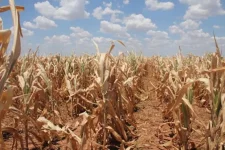The farms in Lusangazi are having a hard time. The sun keeps shining, but no rain comes. This has hurt the corn growing on more than 7,000 fields, and almost 8,000 small farmers worry about their crops.
Friday Sikombe, who helps farmers in the area, says many people planted their corn early, but the dry weather caused their plants to die. He thinks people might not have enough food if the rain doesn't come soon.
The farming experts tell people to try different plants that need less water. They say things like sorghum and cassava might grow better. The Food Reserve Agency helps, too. They sell corn to people who need it.
The farmers had another problem with grasshoppers. These bugs ate corn in Mwanika Camp and ruined 156 fields owned by 57 farmers. The farmers used chemicals to stop the bugs, and they kept watching to make sure the bugs didn't come back.
The whole country of Zambia feels this pain. It hasn't been this dry in 40 years. Corn died on about 1 million fields across the land. The dry weather also means less power. The country can't make enough electricity from its dams.
The leaders in Zambia saw how bad things were getting. In early 2024, they told everyone it was an emergency and promised to help 84 places that needed it most.
Big groups stepped up to help. The World Bank gave $208 million to help families buy food. The IMF added more money, too. They raised their help from $1.3 billion to $1.7 billion.
The United Nations wants to help feed people. It asked for $400 million to buy food, but it only got a small part of what it needed. This means it can't help as many hungry people as it wants to.
The Food Reserve Agency works with the government to sell corn in small towns, which helps families who lost their crops. But everyone knows they need better ways to grow food and different ways to make power. This would help Zambia deal better with dry weather in the future.
Friday Sikombe, who helps farmers in the area, says many people planted their corn early, but the dry weather caused their plants to die. He thinks people might not have enough food if the rain doesn't come soon.
The farming experts tell people to try different plants that need less water. They say things like sorghum and cassava might grow better. The Food Reserve Agency helps, too. They sell corn to people who need it.
The farmers had another problem with grasshoppers. These bugs ate corn in Mwanika Camp and ruined 156 fields owned by 57 farmers. The farmers used chemicals to stop the bugs, and they kept watching to make sure the bugs didn't come back.
The whole country of Zambia feels this pain. It hasn't been this dry in 40 years. Corn died on about 1 million fields across the land. The dry weather also means less power. The country can't make enough electricity from its dams.
The leaders in Zambia saw how bad things were getting. In early 2024, they told everyone it was an emergency and promised to help 84 places that needed it most.
Big groups stepped up to help. The World Bank gave $208 million to help families buy food. The IMF added more money, too. They raised their help from $1.3 billion to $1.7 billion.
The United Nations wants to help feed people. It asked for $400 million to buy food, but it only got a small part of what it needed. This means it can't help as many hungry people as it wants to.
The Food Reserve Agency works with the government to sell corn in small towns, which helps families who lost their crops. But everyone knows they need better ways to grow food and different ways to make power. This would help Zambia deal better with dry weather in the future.












